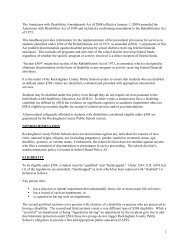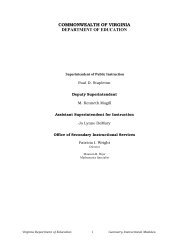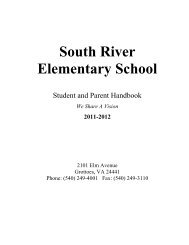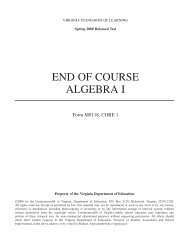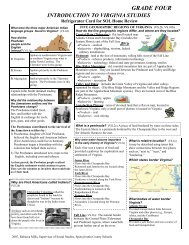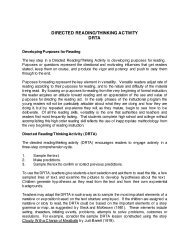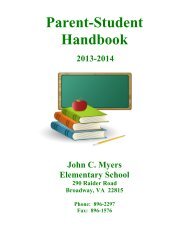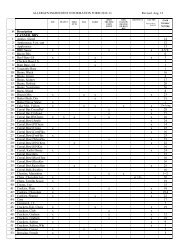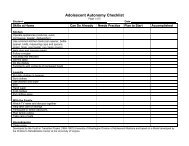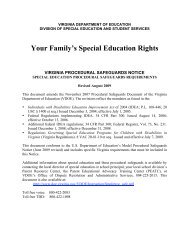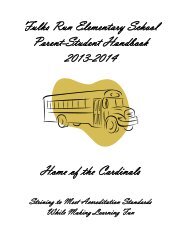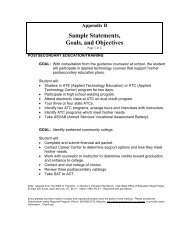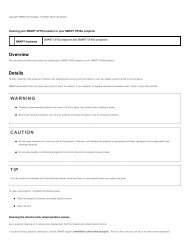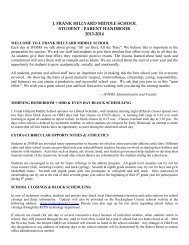McGAHEYSVILLE ELEMENTARY SCHOOL - Rockingham County ...
McGAHEYSVILLE ELEMENTARY SCHOOL - Rockingham County ...
McGAHEYSVILLE ELEMENTARY SCHOOL - Rockingham County ...
Create successful ePaper yourself
Turn your PDF publications into a flip-book with our unique Google optimized e-Paper software.
<strong>McGAHEYSVILLE</strong><br />
<strong>ELEMENTARY</strong><br />
<strong>SCHOOL</strong><br />
PARENT/STUDENT HANDBOOK<br />
2008-2009<br />
“A CARING COMMUNITY OF LEARNERS”<br />
9508 Spotswood Trail<br />
McGaheysville, VA 22840<br />
Phone: 540.289.3004 FAX: 540.289.6832
McGaheysville<br />
A Caring Community<br />
of Learners<br />
CHILDREN
McGaheysville Elementary School<br />
9508 Spotswood Trail<br />
McGaheysville, VA 22840<br />
Phone 540.289.3004 Fax 540.289.6832<br />
Tear Out Here Tear Out Here<br />
August 2008<br />
Dear Parents,<br />
On behalf of the faculty and staff of McGaheysville Elementary School, I would like to welcome you to a new school<br />
year. I look forward to working with you again this year in partnering to educate your child.<br />
Today you are receiving copies of both the McGaheysville Elementary School Parent-Student Handbook and the<br />
<strong>Rockingham</strong> <strong>County</strong> Schools Parent-Student Handbook. These booklets contain information concerning the rules,<br />
regulations, procedures, and an explanation of services offered in our school. Please spend some time acquainting<br />
yourself and your child with this important information. Keep both of these books at home to use as a reference when<br />
you have questions throughout the year. <strong>Rockingham</strong> <strong>County</strong> School Board policy requires each school to document<br />
that we have provided the handbooks to you and that you have read and understand the policies. Please return the form<br />
below with your child to school this week as the documentation.<br />
At McGaheysville Elementary School, we believe that “all children can learn and be successful.” We also believe that<br />
learning occurs best when there is a cooperative effort between the home, school, and community. With the commitment<br />
to student learning from the home, school, and community, I know that each student at McGaheysville Elementary<br />
School will have an exciting and successful year. Please call me if you have any questions or concerns.<br />
Sincerely,<br />
Rebecca Rhodes<br />
Principal<br />
PS- You only need to return this handbook receipt form – not the grey one in the<br />
back of the RCPS handbook – This One Covers Both! Please return as soon as<br />
possible.<br />
-------------------------------------------------------------------------------------------------------------------------------------------<br />
ACKNOWLEDGMENT OF RECEIPT OF PARENT-STUDENT HANDBOOKS<br />
PLEASE RETURN AS SOON AS POSSIBLE<br />
Child’s Name:_________________________________________________ Teacher:_____________________<br />
I have received a copy of both the 2008-2009 Parent-Student Handbooks of McGaheysville Elementary School and<br />
<strong>Rockingham</strong> <strong>County</strong> Schools, which contain McGaheysville School policies and procedures and selected <strong>Rockingham</strong><br />
<strong>County</strong> policies for all schools, PreK-12.<br />
____________________________________________<br />
Parent/Guardian Signature<br />
_________________________________________<br />
Student Signature (if age appropriate)<br />
___________________<br />
Date
Letter from the Principal<br />
and signature sheet<br />
TABLE OF CONTENTS<br />
Section I: Introduction<br />
A. Foreword 1<br />
B. History 1<br />
C. Organization of Staff 2<br />
D. Governance 3<br />
1. School Council 3<br />
2. Parent Advisory 3<br />
3. Parent Teacher Org. 4<br />
4. Business Partnership 4<br />
5. Student Council 5<br />
Section 2: Instructional Program<br />
A. Curriculum and Instruction 6<br />
B. Art 6<br />
C. Challenge Program 6<br />
D. Computer Technology 7<br />
E. Guidance 7<br />
F. Library/Media Center 7<br />
G. Music 7<br />
H. Just Say No (JSN) 7<br />
I. Physical Education/Health 8<br />
J. Grading/Report Card/Honor Roll 9<br />
K. Testing & Assessment 9<br />
L. Homework 10<br />
M. TLC/Remedial 10<br />
Section 3: School Procedures<br />
A. Accidents 10<br />
B. Attendance 11<br />
1. Attendance Awards 11<br />
2. Absences 11<br />
3. Arrival/Dismissal 11<br />
4. Walker/After School Pick-up 11<br />
5. Delays, Closings and Early Dismissal 12<br />
6. Visitors 12<br />
C. Bell Schedule 12<br />
D. Birthday Celebrations 12<br />
E. Change of Address 12<br />
F. Conferences 12<br />
G. Field Trips 12<br />
H. Make Up School Assignments 13
Section 4: Student Conduct & Safety<br />
A. Philosophy 13<br />
B. Dress Code 13<br />
C. Character Counts 13<br />
D. Rotary Award 14<br />
R. Bus Rules 14<br />
F. School Safety 14<br />
Section 5: School Services<br />
A. Food and Nutrition Service 15<br />
1. Mission 15<br />
2. National School Lunch Program 15<br />
3. Financial Procedures 15<br />
4. Offer versus Serve 15<br />
5. Delayed School 16<br />
6. Allergies 16<br />
7. Guests 16<br />
8. Breakfast 16<br />
9. Lunch 16<br />
10. Accounts 16<br />
11. Outside food items 16<br />
B. Lunch Schedule 17<br />
C. Health Services 18<br />
1. School Nurse 18<br />
2. Student Study Team 18<br />
3. Insurance 19<br />
D. School Store 19<br />
E. Newsletter 19<br />
F. Telephone/Fax 19<br />
Section 6: Suggestions<br />
A. Building a Positive Relationship 19<br />
B. Motivating Your Child 20<br />
C. Preparing Your Child for Success 20<br />
Testing Calendar<br />
School Calendar<br />
inside back cover<br />
back cover<br />
<strong>SCHOOL</strong> MOTTO:<br />
BE SAFE<br />
BE KIND<br />
BE RESPONSIBLE
Section 1: INTRODUCTION<br />
A. Forward<br />
This handbook contains policies and procedures that pertain to McGaheysville Elementary<br />
School students. These policies are in accordance with <strong>Rockingham</strong> <strong>County</strong> School Board Policy,<br />
the Constitution of Virginia, and in compliance with the Standards of Quality. Futher information<br />
may be found in the “<strong>Rockingham</strong> <strong>County</strong> Schools Parent-Student Handbook of Selected Policies<br />
and Administrative Procedures for Grades K-12." This handbook is given to all students.<br />
B. History<br />
As early as 1830, a two-story log dwelling was used to educate the children of the<br />
McGaheysville area. This building was replaced in 1850 by a one room structure which was torn<br />
down in 1870. During that year, McGaheysville Male & Female Academy was constructed and<br />
located at a site on Town Hall road (Va. 843) across from “town hall." During the year 1881, the<br />
school name was changed to Oak Hill Academy and would remain so until the construction of a new<br />
school in 1907.<br />
In 1908, McGaheysville High School was built on the present site combining the elementary<br />
and high school. The new school incorporated the small one-room schools from the surrounding<br />
countryside. Forty-one years of expansion and growth brought an end to the usefulness of the<br />
combined elementary and high school. In 1950, Montevideo High School was built incorporating<br />
the high schools of the communities: Grottoes, Keezletown, McGaheysville, and Port Republic. In<br />
June 1950, the last senior class of McGaheysville High School graduated.<br />
McGaheysville Elementary School was organized with grades one through seven until 1964<br />
when Montevideo Intermediate School opened. On January 7, 1968, the proud structure of<br />
McGaheysville Elementary School was destroyed by fire. For slightly more than a year, pupils<br />
attended school in the United Church of Christ and the Methodist Church. Nielsen Construction<br />
Company of Harrisonburg was awarded a $481,153.00 contract building a new fourteen-room<br />
elementary school at McGaheysville. The new structure housed classrooms, cafeteria, kitchen,<br />
teacher’s lounge, and health clinic.<br />
On January 26, 1969, the new building was opened for use. The new building continued to<br />
house grades one through six until the 1976-77 school term when kindergarten was added. The<br />
addition of kindergarten added two mobile units to the school. In the spring of 1980, the sixth grade<br />
was transferred to Montevideo Intermediate School due to the opening of Spotswood High School.<br />
McGaheysville Elementary School presently contains grades pre-kindergarten through five. An<br />
addition and renovation was completed in July 1995 at a cost of approximately four million dollars.<br />
PRINCIPALS OF EXISTING MCGAHEYSVILLE BUILDING<br />
Rebecca Rhodes July 2007-<br />
William Rauss July, 2001-July 2007<br />
David Burchfield July, 1997- July, 2001<br />
Nancy J. Lantz August, 1991- July, 1997<br />
Gwen Edwards July, 1989- July 1991<br />
W. Marshall Price July, 1985- July, 1989<br />
Jared Clem July, 1983- July, 1985<br />
John Kidd July, 1978- July, 1983<br />
Bob Knighton July, 1977- July, 1978<br />
Wayne Nutter July, 1967- July, 1977<br />
1
C. Organization of Staff & Faculty<br />
Principal<br />
Rebecca Rhodes<br />
Assistant Principal<br />
Sharon Martz<br />
Bookkeeper/Sec. Secretary Office Sec./Library Sec.<br />
Tina Dofflemyer Linda Bodkins Kay Davis<br />
4 Year-Olds:<br />
Therese Warner<br />
Kindergarten: First Grade: Second Grade:<br />
Kathey Clanahan Angela Beagle Bonnie Downey<br />
Margaret Clark Tara Cupp Shannon Dean<br />
Barbara Raines Heather Golladay Debbie Swartley<br />
Janice Wille<br />
Michele Sheffer<br />
Third Grade: Fourth Grade: Fifth Grade:<br />
Kristen Caplinger Amanda Masters Marianne Cline<br />
Rachel Moyer Sandy Miller Jody McCurdy<br />
Etta Howard Carolyn Morris Kim Phillips<br />
Kim Mizell<br />
Specialty Team:<br />
Art – Edwina George<br />
Guidance Counselor- Judi Fields<br />
Music- Kari Carpenter<br />
Media Specialist- Susan Morris<br />
Physical Education- Jan Wampler<br />
Physical Education- Anne Scott<br />
Physical Education – Debbie Mason<br />
Nurse- Lillian Barnhart<br />
TLC- Heather Gigliotti<br />
Challenge- Krista Miller<br />
Speech Therapist- Jana Bennett<br />
Special Education- Barbara Miller<br />
Special Education- Donna Slye<br />
Special Education- Cherry Tharp<br />
Special Education- Melissa Benson<br />
ELL – Beth Smith<br />
Instructional Assistants:<br />
Computer Lab- Lou Kirkendall<br />
Special Education- Brenda Garrison, Barbara Balser, Cathy Crider<br />
Autistic Assistants- Lori Haugh, Leslie Shifflett, Ginger Meadows<br />
4 Year-Olds- Michele Wilder<br />
TLC Assistants- Donna Dobbs, Beth Smith<br />
Teaching Assistant- Traci Breeden<br />
Custodial Staff:<br />
Food Service Staff:<br />
Randall Knight (head custodian) Theresa Brownell (manager) Crystal Conley<br />
Vickie Knight Ginger Good Holly Hensley<br />
Goldie Mullins Samantha Powell Donna Shifflett<br />
Carla Morse<br />
Ann May<br />
Bus Drivers:<br />
Lowell Wright, Mary Taylor, Diana Shifflett, Thomas Schroeder, Tina Hawkins, Jeanne Dean, and<br />
Brenda Garrison<br />
2
1. School Council<br />
D. Governance<br />
The purpose of the McGaheysville Elementary School Council is to establish direction for<br />
the school, to develop the school budget, to assess home-school communications, and to<br />
communicate with subgroups that serve the school. Serving along with the administrative team are<br />
three parents and five MES staff members. Each council member serves a 2-year term, and all<br />
parents are eligible to serve as council members. The Council meets five times during the school<br />
year at 3:15 pm in the school conference room. The first few minutes of each meeting are set aside<br />
for parents or staff members to share their thoughts, ideas, suggestions, or concerns about school<br />
wide issues. The remainder of each meeting is devoted to the council’s primary decision-making<br />
duties. All parents are invited to attend School Council meetings.<br />
School Council Members<br />
Rebecca Rhodes<br />
Principal<br />
Sharon Martz<br />
Assistant Principal<br />
Therese Warner<br />
Grades Pre-K-1<br />
Etta Howard Grades 2-3<br />
Sandy Miller Grades 4-5<br />
Donna Slye<br />
Special/Support Programs<br />
Lou Kirkendall<br />
Classified Staff<br />
TBD<br />
Parent Representing Grades PreK-3<br />
Tonia Campillo Parent Representing Grades 4-5<br />
Joann Lawhon<br />
Parent Representing Special Support Programs<br />
Meeting Dates<br />
October 22<br />
November 19<br />
February 18<br />
April 22<br />
2. Parent Advisory Committee<br />
Parents play a vital role in the education of their children as well as in the operation of the<br />
school. Parents are encouraged to attend Parent Advisory Committee (PAC) meetings. The<br />
purpose of these meetings is to allow an open forum for discussion of issues pertaining to MES and<br />
to identify ideas and suggestions for the improvement of the school. PAC is held the first Thursday<br />
of each month at 6:00 pm) in the school library. Stacy Schumacher will serve as our parent<br />
representative on the county-wide Parent Advisory Committee, which meets monthly with Dr. Carol<br />
Fenn, Superintendent.<br />
Meeting Dates:<br />
September 4 February 12<br />
October 2 March 5<br />
November 6 April 2<br />
December 4 May 7<br />
January 8<br />
3
3. Parent Teacher Organization (PTO)<br />
All parents, faculty, staff members, and students of McGaheysville Elementary School<br />
are members of the Parent Teacher Organization. Membership dues are not required for<br />
membership. Although it is an independent organization, the proposed PTO guidelines call for it<br />
to serve as the primary service and fundraising arm of McGaheysville Elementary. PTO<br />
Meetings are held the first Thursday of each month at 7:00 pm in the school library. A copy of<br />
the guidelines may be obtained by contacting a member of the PTO Executive Board. Look for<br />
announcements concerning PTO in the monthly PTO newsletter as well as the Lion Tales.<br />
McGaheysville PTO Executive Board:<br />
President<br />
Vice President<br />
Corresponding Secretary<br />
Recording Secretary<br />
Treasurer<br />
Hospitality<br />
Fund Raising<br />
Co-Volunteer Contacts<br />
Administrators<br />
Amanda Nott<br />
Lillian Barnhart<br />
Chasity Trimble<br />
Evette Hill<br />
Michelle Wilder<br />
Joanna Lawhon<br />
TBD<br />
Janice Wille, Michele Sheffer<br />
Rebecca Rhodes, Sharon Martz<br />
Meeting Dates:<br />
September 4 February 12<br />
October 2 March 4<br />
November 6 April 2<br />
December 4 May 7<br />
January 8<br />
4. Business Partnership Steering Committee<br />
The McGaheysville Elementary School Business Partnership Steering Committee provides<br />
leadership for the school’s associations with local businesses and community groups. Its primary<br />
area of oversight involves the partnerships between McGaheysville, Merck, and the Shenandoah<br />
National Park. Some of the other organizations who serve as partners with McGaheysville<br />
include James Madison University, Bridgewater College, Eastern Mennonite University, Cici’s<br />
Pizza, Crutchfield, Burger King, Costco, and The Fun Zone. Any parents interested in assisting<br />
with the Business Partnership Committee may contact an administrator for meeting information.<br />
Business Partnership Committee<br />
Janice Wille, co-chair<br />
Jana Bennett<br />
Edwina George<br />
Michelle Sheffer, co-chair<br />
Angela Beagle<br />
Margaret Clark<br />
4
5. Student Council Association (SCA)<br />
The McGaheysville Elementary School Student Council Association represents all students<br />
of the school and it is sponsored by Marianne Cline. The SCA is made up of five officers,<br />
Committee Chair people, and a representative from each classroom (grades 2-5). The council<br />
meets monthly to discuss school-related business and activities. It is the responsibility of each<br />
classroom representative to relay information between his or her class and the council. The SCA<br />
sponsors school activities to encourage school spirit, assist with fund raising, promote<br />
community awareness, and provide support for other school programs.<br />
School Spirit Day<br />
One day per month the SCA sponsors a School Spirit Day. All students and teachers are encouraged<br />
to show their MES spirit by wearing blue and white or a MES t-shirt/sweatshirt on these days.<br />
August 29<br />
September 30<br />
October 31<br />
November 28<br />
December 19<br />
January 30<br />
February 27<br />
March 31<br />
April 30<br />
May 29<br />
5
Section 2: INSTRUCTIONAL PROGRAM<br />
A. Curriculum and Instruction<br />
McGaheysville Elementary School offers children in pre-kindergarten through 5 th grade a<br />
challenging curriculum and instructional program. Much of the day is spent focusing on the<br />
development of skills and understandings in the following core areas: language arts, including<br />
reading, spelling and writing, mathematics, science and social studies. The objectives for each of<br />
these areas of the curriculum (Virginia’s Standards of Learning) are described in a booklet<br />
distributed at the beginning of the school year. Many of the objectives, especially those related to<br />
content areas, are organized into themes or units of study by grade level teachers in order to make<br />
your child’s learning experience as meaningful and relevant as possible.<br />
Many other areas of the curriculum are briefly described below. With any curriculum area,<br />
the challenge for the school in teaching is to try to balance the strengths, needs, and interests of the<br />
individual child with those of the classroom group. Many of the Parent Advisory Community<br />
meetings (first Thursday of the month at 7:00 p.m. – see page 3 in this handbook) are devoted to<br />
informing parents about current issues about curriculum, instruction, testing, and assessment.<br />
Please review the information below, and feel free to contact your child’s teacher or one of<br />
the administrators if you have any questions or concerns.<br />
B. Art<br />
Art Education is offered to all children in the elementary school to help them develop an<br />
aesthetic and conceptual understanding. Children/students receive the equivalent of 30 minutes a<br />
week for the whole school year.<br />
C. Challenge Program<br />
<strong>Rockingham</strong> <strong>County</strong> Public Schools provides a program of gifted education that is<br />
individualized and differentiated to meet the unique needs of identified gifted students at all grade<br />
levels, kindergarten through 12 th grade. The Challenge Program is a part of the instructional<br />
program during the regular school day and also has an after school component.<br />
D. Computer Technology<br />
Students at McGaheysville Elementary are given the opportunity to learn and practice<br />
computer concepts and operations through the availability of computers in the classroom and in a lab<br />
setting. Each class has several regularly scheduled computer lab visits per week. The use of the<br />
computer is integrated into many classroom subjects and activities.<br />
6
E. Guidance<br />
A school counselor works with individual students, small groups, and classrooms.<br />
Conferences with a parent can also be arranged with the counselor. Please call the school for an<br />
appointment.<br />
The counselor works with the entire school on the Character Counts Program and with the<br />
fourth and fifth graders on “Getting Real about Violence.” The Character Counts Program<br />
emphasizes the six pillars of character: citizenship, caring, trustworthiness, fairness, respect, and<br />
responsibility.<br />
F. Library/Media Center<br />
The Media Center is the resource center for the school. The library collection includes<br />
reference books, fiction and nonfiction books, picture books, book-related items (listening sets,<br />
puppets, etc.), current children’s magazines, and newspapers. In addition, the Audio Visual room<br />
houses materials such as computer programs, filmstrip sets, videotapes, laser disks, study prints,<br />
cassette tapes, records, and AV equipment.<br />
Each student visits the library on a weekly basis for instruction in the areas of reference and<br />
research, use of technology, book talks, and story sessions. Students are also encouraged to use the<br />
library throughout the day for research, browsing, and reading.<br />
G. Music<br />
The purpose of the music program is to provide children the opportunity to express<br />
themselves musically, to appreciate the great variety of music available, and to gain basic skills and<br />
concepts. This will form a basis for later music experiences. The music program is an extension of<br />
the classroom. Students participate in one music lesson each week. The music teacher also serves<br />
as a resource person for the classroom teachers. There is an opportunity to join a fourth grade<br />
chorus and a fifth grade chorus which will meet after school. An orf ensemble is also offered to fifth<br />
graders. A variety of school programs are present for students to display their talents.<br />
H. Just Say No (JSN)<br />
The Just Say No Club is for 4th and 5th graders, and it is sponsored by the school nurse,<br />
Lillian Barnhart. The purpose of this club is to educate students about the dangers of drugs, alcohol<br />
and tobacco as well as how to handle peer pressure. Guest speakers from area organizations are<br />
invited to talk with the children about a variety of topics. The club meets on the second Wednesday<br />
of the month after school until 4:15pm. All 4th and 5th graders are invited to join and must have a<br />
permission slip signed by a parent or guardian in order to join the club.<br />
7
I. Physical Education/Health<br />
A comprehensive PE program with an emphasis on individual student total well being is an<br />
essential part of a child’s education. Every child in grades K-5 receives three 30-minute lessons<br />
from the physical education teacher each week. The developmental curriculum takes the basic skills<br />
taught in the movement program and develops them into individual and team sports. Game skills<br />
and positive attitudes are emphasized. Health is taught both by prepared units in the classroom and<br />
projects. Each student must follow these Fitness Education Class Expectations:<br />
1. Be Safe 2. Follow Directions<br />
3. Try Your Best 4. Show Good Sportsmanship<br />
Participation is a key ingredient to any successful learning experience. A written excuse from a parent<br />
and/or doctor is required when a student is medically unable to participate. In order to participate<br />
safely, students must wear soft-soled, low-heeled shoes that fully enclose the foot (boots, hard or<br />
leather soled, dress shoes, high-heeled shoes, sandals, flip-flops, etc. are NOT acceptable fitness<br />
shoes).<br />
Grading Procedures<br />
Students in kindergarten are graded in two major categories:<br />
1. Participation, which includes safety, wearing proper shoes, listening and following directions,<br />
attitude, and sportsmanship; and<br />
2. Sportsmanship, which includes respect, fair playing, and handling competitive and cooperative<br />
activities successfully.<br />
Students in first through fifth grade are graded in three major categories:<br />
3. Participation, which includes safety, wearing proper shoes, listening and following directions,<br />
attitude and sportsmanship;<br />
4. Sportsmanship, which includes respect, fair playing, and handling competitive and cooperative<br />
activities successfully; and<br />
5. Skill level, which includes age-appropriate knowledge and performance of skill and/or movement<br />
concepts, improvement and effort.<br />
Participation and Sportsmanship grades are determined by a ticket system. The ticket system helps to hold<br />
students accountable for their own actions and gives teachers a basis for grading. Tickets correspond with the four<br />
Physical Education Expectations. For example, if a student deliberately acts unsafe during an activity, he/she<br />
would be asked to get a blue “Be Safe” ticket from the ticket box and complete the required information (name,<br />
classroom teacher, date and a check beside one of the listed specific actions or explanations). After showing the<br />
ticket to the teacher, the ticket is retained. Usually the student may then go back to participate in the current<br />
activity. One or two tickets may negatively impact the student’s grade. Three or more tickets will result in a<br />
lower grade. A ticket-eraser or extra credit can be earned by a written project or a detailed drawing (one project<br />
cancels one ticket). Each student starts with a “clean slate” for the next six-week period.<br />
Skill level grades for students in kindergarten are assessed with tests that determine the student’s ability to<br />
demonstrate certain skill and/or movement concepts (such as skipping, galloping, etc.) and on written<br />
assignments, which include the student’s fitness books, dance worksheets and other work.<br />
Skill level grades for students in first through fifth grade are assessed with tests that determine the student’s<br />
ability to demonstrate certain skill and/or movement concepts (such as jumping and landing, balancing, striking,<br />
etc.) and on written assignments, which include the student’s fitness books, dance worksheets, and other work.<br />
8
J. Grading/Report Card/Honor Roll<br />
We believe that realistic evaluation of the learner’s achievements and communication<br />
between home and school are essential components of the learning process.<br />
Parent-teacher conferences are scheduled twice each year, but are always encouraged at the<br />
parent or teacher’s discretion. A written evaluation is sent home six (6) times a year. This<br />
evaluation is designed to communicate achievements in regard to the student’s individual abilities<br />
and performance in relation to his or her peers. The responsibility for effective evaluation and<br />
communication lies with both the parent and the teacher.<br />
A graded progress report will be issued every six weeks for grades 1-5. Kindergarten reports<br />
are sent at the end of each 9-week grading period. Rating scales and check lists may also be used by<br />
teachers to provide additional information on a pupil’s progress.<br />
The following symbols will be used:<br />
Kindergarten Grade 1 Grade 2<br />
S- Satisfactory O- Outstanding Core Subjects:<br />
P- Progressing S- Satisfactory A - Outstanding<br />
N- Needs to Improve P- Progressing B - Above Average<br />
N- Needs to Improve C - Average<br />
N - Needs Improvement<br />
Other Subjects: O, S, P, N<br />
Grades 3, 4, 5<br />
Core Subjects:<br />
A - Outstanding<br />
B - Above Average<br />
C - Average Work<br />
D - Below Average Work<br />
F - Progress Too Slow for Successful Completion of Subject Requirements<br />
Other Subjects: O, S, P, N<br />
Each six weeks, 3 rd , 4 th , and 5 th grade students who have earned all A’s or B’s on their report<br />
cards are recognized as A-B Honor Roll students. These students’ names will be displayed in the<br />
“Hall of Honor” and will be submitted to local newspapers for publication.<br />
K. Testing and Assessment<br />
Testing is done on an individual and group basis by school personnel to help teachers<br />
develop an instructional program for each child based on his/her needs. Student testing is required<br />
by the Virginia Department of Education and <strong>Rockingham</strong> <strong>County</strong> Public Schools. Tests given to<br />
elementary students include:<br />
PALS (Phonemic Awareness Literacy Scale) – PreK, Kindergarten, 1 st , 2 nd , and 3 rd grades;<br />
State Standards of Learning Tests - Grades 3, 4 & 5;<br />
<strong>County</strong> (Local) Standards of Learning Tests - Grades 1, 2, and 4.<br />
9
L. Homework<br />
The objective of homework is to assist and improve learning and strengthen skills and<br />
understandings gained in the classroom. The types of homework include: practice to reinforce<br />
newly acquired skills; preparation to obtain background for new classroom information; and<br />
extension to apply knowledge in creative ways. <strong>Rockingham</strong> <strong>County</strong> Public Schools has adopted the<br />
following guideline for types and length of homework assignments:<br />
1. Kindergarten: Minimal, as needed, and based on teacher judgment of student need<br />
2. Primary Grades 1-2: 15-30 minutes total, assigned daily, as needed<br />
a. Homework is started in the educational program<br />
b. Homework is assigned at the discretion of teacher with an emphasis on reading, math, and<br />
language arts<br />
3. Elementary Grades 3-5: 30 minutes to 1 hour total, assigned daily, as needed<br />
a. Homework is started in the educational program<br />
b. Long-term assignments may be given which will assist the student in learning and in<br />
developing initiative and responsibility<br />
M. TLC/Remedial<br />
A TLC (The Learning Connection) Remedial Education teacher and instructional assistant<br />
work with children who qualify for extra support in reading and math. This supplements the regular<br />
program in the classroom. The Darrell Morris Reading Model is used as a part of the instructional<br />
program.<br />
Section 3: School Procedures<br />
A. Accidents<br />
If a student is injured at school, parents will be notified. If necessary, a parent/guardian will<br />
be asked to pick up a child. In extreme emergencies, the rescue squad will be called to take the<br />
student to the outpatient department of <strong>Rockingham</strong> Memorial Hospital. It is very important that the<br />
school have a phone number where parents can be reached during the day (please update the<br />
telephone number if it changes during the school year). A copy of your child’s registration form for<br />
entering school will be sent along with your child to the hospital.<br />
10
B. Attendance<br />
In order for a child to be successful in school, he/she must attend regularly and arrive on time every day.<br />
Virginia law requires school-home contact each day a child is absent.<br />
1. ATTENDANCE AWARDS: Perfect Attendance is encouraged 8:10 AM - 3:00 PM; exceptions are<br />
at the discretion of the principal.<br />
1. At the end of each school year, students will receive awards for Perfect Attendance. A Perfect<br />
Attendance Award will be given to students who attend school everyday and are tardy (or early<br />
dismissal) no more than 8 times during the entire school year.<br />
2. A Good Attendance Award is given at the end of each school year. A Good Attendance Award will<br />
be given if a student misses no more than three days of school and is tardy (or early dismissal) no<br />
more than 8 times during the entire school year.<br />
2. ABSENCES:<br />
1. Please notify the school by phone (289-3004) by 10:00 a.m. daily. The school must contact parents<br />
who do not call the school by 10:00 a.m. at home or at work.<br />
2. Send a note when the child returns to school, which briefly explains the absence. A telephone call or<br />
a note to the office is required.<br />
3. ARRIVAL/DISMISSAL:<br />
1. Students needing to go home in a manner which differs from the regular schedule must have written<br />
permission from home and have it approved by the office.<br />
2. Any student wishing to be dismissed early or to leave the school grounds must have a note from home<br />
and permission from the office.<br />
3. Students should not arrive at school before 8:05 a.m. and should be picked up by 3:15 p.m. We do<br />
not have a staff member on duty before or after these hours<br />
4. Students arriving between 8:05-8:10 a.m. are to report to the cafeteria for supervision.<br />
5. ALL PARENTS PICKING UP CHILDREN EARLY MUST SIGN THEIR CHILD OUT AT THE<br />
OFFICE. The child will be called to the office for dismissal. Teachers have been instructed not to<br />
release students to adults who come to their classroom door.<br />
6. When a student is going home with another student, both students must have written permission<br />
from home.<br />
7. A note must be sent if someone (other than the parent) picks up a child (listing them on the<br />
emergency list does not give them permission to pick up children).<br />
8. Please keep in mind consistent “going home” schedule/procedures for your child are very important.<br />
This prevents confusion on our part and the child.<br />
4. WALKER/AFTER <strong>SCHOOL</strong> PICK-UP:<br />
a. The walker/after school pick-up room will be in the music room. You will enter the gym by the<br />
OUTSIDE CORNER DOOR AT THE GYM and wait there to be called to start signing out<br />
students, usually not before 3 pm. Please do not enter the building before the 3:05 pm bell rings.<br />
Storage<br />
Playground<br />
Area<br />
Gym<br />
Stage<br />
Area<br />
Parking<br />
Area<br />
ENTER<br />
HERE<br />
Class<br />
room<br />
Parents line up here<br />
Music<br />
room<br />
Courtyard/grass area<br />
Storage<br />
11
5. DELAYS, CLOSINGS AND EARLY DISMISSAL:<br />
Listed are the stations to listen to if the weather becomes questionable: WAMM -1230 AM<br />
Latino, WHBG-1360 AM, WSVA-550 AM , WHSV-TV 3, WKCY-1300 AM,<br />
WVIR- Channel 29, WBTX-1470 AM<br />
Radio<br />
6. VISITORS:<br />
1. For the security of the children and the building, all visitors entering school grounds are required<br />
to report to the office to sign in and receive an appropriate pass.<br />
2. Children (preschoolers and school age) visiting classrooms should be approved by the principal.<br />
3. A note must be sent to school giving permission for someone other than the parent or guardian<br />
to eat with a child.<br />
C. Bell Schedule<br />
8:05- Earliest students can be dropped off and a bell will ring to enter the building<br />
8:10- Buses arrive and unload<br />
8:30- School begins<br />
8:30- Tardy bell rings<br />
3:00- Bus dismissal<br />
3:05- Walkers dismissed to designated area<br />
D. Birthday Celebrations<br />
Teachers will not be allowed to give out students’ names and addresses for birthday invitations.<br />
Because we wish to be sensitive to children’s feelings, parents are not to send birthday or party<br />
invitations to school to be passed out unless every student in the classroom receives an invitation.<br />
The PTO, with parent permission, prepares a school directory of student names, addresses and<br />
telephone numbers at the beginning of the school year.<br />
E. Change of Address<br />
If you have a change of address or telephone number during the school year, please notify your<br />
child’s teacher and the office in writing, so that we can keep our records up to date.<br />
F. Conferences<br />
Parents who desire a conference with a teacher should call or send a note to the teacher.<br />
Conferences should be scheduled after school hours. The administrators are also available for<br />
conferences at your request. We encourage you to arrange visits to classrooms with the teacher<br />
and/or administration.<br />
G. Field Trips<br />
All classes take field trips during the school year. Parents are encouraged to volunteer to be<br />
chaperones. We hope that all parents who wish to be a chaperone have the opportunity during the<br />
year. Please remember that all chaperons are expected to abide by all RCPS policies and regulations<br />
while serving on the school field trips, this includes the “drug-free,” “tobacco-free,” and dress code<br />
school policies. Chaperones should not bring siblings on the field trip.<br />
We request that students return to school following a field trip for dismissal. Pre-approved<br />
chaperones, staff, and students in the participating class are the only persons allowed to ride the bus<br />
to and from field trips.<br />
12
H. Make-Up School Assignments<br />
When a student is or will be absent from school, parents are encouraged to contact the school<br />
to get missed assignments. Please allow 2 to 4 hours from the time of contacting the school before<br />
picking up work to allow teachers time to prepare the assignments.<br />
If your child will be absent for an extended length of time, please notify the teacher as soon<br />
as possible. However, it may be impossible to give the entire assignment list at that time.<br />
Section 4: STUDENT CONDUCT AND <strong>SCHOOL</strong> SAFETY<br />
A. Philosophy<br />
The guiding principals that we live in learn by at McGaheysville Elementary School are<br />
BE SAFE BE KIND BE RESPONSIBLE<br />
All of the procedures and rules in our school (classrooms, playground, buses, cafeteria, etc.)<br />
reinforce these guiding principles. Each classroom teacher will share additional information<br />
concerning classroom procedures and expectations for student conduct and safety. The <strong>Rockingham</strong><br />
Public Schools Handbook contains further detailed information concerning student conduct, dress,<br />
bus safety and discipline.<br />
B. Dress Code<br />
<strong>Rockingham</strong> <strong>County</strong> School Board Policy provides certain examples of dress/attire, which are<br />
unacceptable under the terms of <strong>Rockingham</strong> <strong>County</strong> Schools’ Code of Responsible Student<br />
Conduct. The listing includes:<br />
• Clothing which exposes undergarments, is immodest, or is worn in an unconventional manner<br />
• Dog collars and chains<br />
• Dress that inflames or defames<br />
• Dress promoting or depicting a drug, tobacco, alcohol, violence, or sexually implicit or explicit message<br />
• Dress with profane statements or meanings<br />
• Dress which promotes or proclaims gang activities<br />
• Hats or caps shall not be worn inside schools during regular school hours<br />
Further specific examples include see-through apparel, tops exposing the midriff, cleavage and strapless or spaghetti<br />
string tops. Only customary earrings worn in the ear are acceptable. Skirts worn should be mid-thigh length or longer.<br />
Shorts should be sufficiently long to enable the fingertips to reach the end of the leg length when standing in a relaxed<br />
manner. Tank tops should not have arm openings that expose the chest or undergarments. Heel wheels are prohibited.<br />
It is clearly understood that appropriate dress within our schools enhances school climate and promotes student learning.<br />
C. Character Counts<br />
McGaheysville Elementary School is a safe and orderly place where all students learn early<br />
that individual rights must be balanced by responsibility to the group. The school embraces the<br />
School Board approved program, Character Counts, with these six pillars of character development:<br />
TRUSTWORTHINESS CARING RESPONSIBILITY<br />
RESPECT CITIZENSHIP FAIRNESS<br />
McGaheysville Elementary strives to be a caring place where the principal, assistant<br />
principal, teachers, staff, and students are respectfully attentive to each other. There will be further<br />
information regarding our school’s activities and use of the Character Counts program throughout<br />
this coming school year.<br />
13
D. Rotary Award<br />
Thomas L. Yancey, Jr. established the Thomas L. Yancey, Jr. McGaheysville Elementary<br />
School Rotary Award for those who exemplify the criteria of the Rotary Code of Ethics through<br />
his/her daily activities and relationships. The McGaheysville Elementary Award winners will be<br />
presented a cash award and be recognized at the Rotary Code of Ethics Awards luncheon to be held<br />
the first Monday in May. The past recipients of the award have taken pride in being recognized as<br />
individuals who personified the Code of Ethics principles throughout their educational training.<br />
1991-1992 1992-1993 1993-1994 1994-1995 2007-2008<br />
Dale Smiley Derek Hammer Candy Morris Jessica Raynes Jeff Bailey<br />
Christine Liskey Jessica Osborn Joseph Muia Michael Sheehan Ashton Hoy<br />
1995-1996 1996-1997 1997-1998 1998-1999<br />
Justin Morris Ashley Lam Ryan May Taylor Meadows<br />
Amy Tehlewitz Stuart Robinson Chelsea Day Jonathan Dillenbeck<br />
1999-2000 2000-2001 2001-2002 2002-2003<br />
Michael Good Christopher Bodkins Matt Kyger Garrett Burks<br />
Laura Monger Allison VanBenschoten Lauren Greene Heather Shifflett<br />
2003-2004 2004-2005 2005-2006 2006-2007<br />
Veoleta Khatman Jonathan Mills Zachary McDaniel Caleb Detamore<br />
Luke Michael Hallie Pence Miranda Saum Emma Pence<br />
E. Bus Rules<br />
Bus transportation is a privilege provided by the <strong>Rockingham</strong> <strong>County</strong> Public Schools.<br />
McGaheysville Elementary School expects all students to demonstrate the three guiding principles<br />
for behavior: BE KIND, BE SAFE, and BE RESPONSIBLE on the bus, as well as on school<br />
grounds. McGaheysville Elementary School supports and follows the <strong>Rockingham</strong> <strong>County</strong> Public<br />
Schools Transportation Guidelines and Rules. Each parent/guardian and student must sign and<br />
return a transportation agreement that must be followed. Please read and review these rules with<br />
your child throughout the school year.<br />
F. School Safety<br />
At McGaheysville Elementary School we maintain a safe school environment to promote<br />
learning. The Safe School Committee developed a Safe School Plan which outlines specific<br />
procedures for emergency situations such as fires, bomb threats, intruders, and hazardous materials.<br />
Routine training and practice drills are conducted with teachers, staff, and students throughout the<br />
school year. Local fire and emergency personnel are involved in the review and implementation of<br />
the school safety policies. A Safe School Audit was completed in the spring of 2007. All of this<br />
information is available for review in the school office.<br />
In accordance with the Asbestos Hazard Emergency Act in conjunction with the<br />
Environmental Protection Agency, we are making our yearly notification that our school building<br />
contains asbestos containing material. An operation and management plan was developed in 1988,<br />
and all 3-year follow-up inspections have been conducted to help us manage the materials in a<br />
manner that eases the safety of our students, employees, and vendors. You may examine the O & M<br />
plans located in the division maintenance office from 8 – 4 Monday through Friday, or you may<br />
contact the division Asbestos Coordinator at 434-4434.<br />
14
Section 5: School Services<br />
A. FOOD AND NUTRITION SERVICES<br />
1. Mission: The Food and Nutrition staff believes each student is a most valued customer. Each<br />
customer will be offered a variety of appetizing, high quality, nutritious food, served promptly at<br />
the proper temperature and at a reasonable cost. Students, parents, and school personnel will be<br />
served by friendly, caring, food service staff in a clean, pleasant, and safe environment. Students<br />
will be encouraged to learn about the importance of proper nutrition and will be active<br />
participants in the meal program.<br />
2. National School Lunch Program:<br />
a. Free/reduced price meal applications – Each student receives an application form at the<br />
beginning of the school year. To qualify, an approved, complete application form must be on<br />
file. Returning students must submit a form annually (during first 10-days of school) and as<br />
household circumstances change. Applications from students entering school after the initial<br />
10-day grace period must be approved before benefits are granted.<br />
b. Breakfast – Each school offers a breakfast program (exception TA). Free/Reduced lunch<br />
eligibility extends to breakfast.<br />
c. Extras – If a student qualifies for free meals and packs lunch and desires to drink milk, the<br />
price of this (or other a la carte items) will be subtracted from the positive account balance or<br />
require cash.<br />
3. Financial Procedures:<br />
a. Pre-payment system – Each student is assigned a cafeteria number. This number is used at the<br />
point of service and is never to be shared. It is preferred that pre-payment money be paid by<br />
check (identified with account number). For elementary and middle school students, cash<br />
should be placed in an envelope and clearly marked with the student’s name and account<br />
number. Once the money is deposited in the student’s account, the school cannot distinguish<br />
or control how it is “spent.” The parent and student must communicate about the selection of<br />
breakfast, a la carte items, etc.<br />
b. Prices School Level Breakfast Lunch<br />
Full-paying Elementary $1.00 $1.75<br />
Reduced All $.30 $0.40<br />
Adults All $1.25 $2.50<br />
c. Charging – Guardians are financially responsible for all items purchased by their child(ren).<br />
Students are notified in the serving line as the account balance begins to approach a zero<br />
balance. Every effort should be made to avoid reaching a zero balance. In the event it<br />
reaches zero, the following procedures apply:<br />
Elementary School – No a la carte purchases permitted (cash or account). A student in 2 nd<br />
through 5 th grade may be asked to be at the end of the class line. This student would be<br />
required to complete a charge slip (breakfast and/or lunch) located in the general area of the<br />
serving line. The cashier will complete the charge slip for kindergarten and 1 st grade students,<br />
but the student will be delayed. A negative balance notification (charge slip) will be sent<br />
home with the student on the day it occurs.<br />
4. Offer versus Serve: To be served and counted as a meal, a student may refuse one menu item at<br />
breakfast. Middle and High school students must select three of the five lunch menu items.<br />
Elementary students in 2nd through 5 th grade may refuse one of the five lunch menu items.<br />
15
5. Delayed School: One hour, breakfast served. -- Two hour, breakfast not served.<br />
6. Allergies: Students with special dietary needs or allergies require an annual physician statement.<br />
7. Guests: Welcome anytime! Please call/contact school in advance if planning to eat a meal.<br />
8. BreakfastBreakfast is served in the cafeteria from 8:05-8:30 a.m. Students eating breakfast are to<br />
report to their classroom before going to the cafeteria. Students not eating breakfast are to go directly<br />
to homeroom.<br />
9. Lunch<br />
A well-balanced nutritious lunch is available to all students. Students are given an account number for<br />
breakfast and lunch purchases. Parents may pre-pay for meals weekly, monthly, or in any amount.<br />
Each time a student purchases a meal, extra milk, juice, ice cream, etc. the amount is deducted from<br />
that student’s account. Free and reduced price meals are available to those families who qualify. The<br />
application form for free and reduced price meals is either sent home when the child enters or may be<br />
requested throughout the school year.<br />
LUNCH COSTS:<br />
Full Paying Students.......... $1.75 (includes milk) Weekly Lunches........ $8.75<br />
Reduced Price Student....... $0.40 (includes milk) Juice (extra)............... $1.00<br />
Main entrée only................ $1.50 (3 rd , 4 th , 5 th graders) Milk (extra)............... $0.35<br />
Ice Cream (Fri).................. $0.75 (1 st -5 th graders) Adult Lunches........... $2.50<br />
Students in grades 2-5 participate in offer vs. serve. These students may refuse an item at lunch and<br />
thereby receive four of the five menu components. Third, fourth and fifth grade students are also<br />
given the opportunity to purchase extra main entrée items at a la carte prices. Students will have to<br />
either have cash or sufficient money in their accounts. Please understand that it is not the<br />
responsibility of the cafeteria staff or teachers to determine how money is spent in the account.<br />
Discuss with your child how money is to be spent.<br />
10. Accounts<br />
Every Monday or the first day of the week at 1:30 p.m. balances will be taken on all student accounts.<br />
If a student owes money to their accounts, a form letter will be sent home. The amount due should be<br />
added to the amount of money planned for the next payment. After a week with charges still on the<br />
account, the cafeteria manager will attempt to call the parent/guardian. Further nonpayment will lead<br />
to notification to <strong>Rockingham</strong> Public Schools’ Director of Food and Nutrition Services. If a student<br />
owes money in their account, a la carte items and extra entrees may not be purchased until charges are<br />
paid in full. Please make every effort to keep accounts paid in full. While it is possible a student<br />
could come to school without lunch money, recurrent charging of meals is not permitted. Pre-paying is<br />
a great way to insure that there is sufficient money in a student’s account. Unless a student is eligible<br />
to receive free meals, it is the responsibility of the guardian to pay for food served to the student.<br />
Guardians are financially responsible for all meals and a la carte items served to their child and must<br />
notify the school manager if breakfast or a la carte items are not to be served to a student.<br />
11. Outside food items<br />
a. If a child chooses to pack their lunch, please do not send food or drink in glass containers<br />
and do not send carbonated drinks. Also, please do not send fast food or bring fast food for<br />
lunch. Remember to be careful that packed food does not need refrigeration or needs to be heated.<br />
b. The sale of candy and other food items interfering with a nutritious meal is not allowed.<br />
c. Foods brought to school by students and others – Students are not to regularly consume<br />
commercial restaurant foods-to-go while in the cafeteria area prior to or during lunch periods.<br />
This does not preclude students from bringing packed lunches. Students are not to receive food<br />
from others during meal periods (exception-parents for their own children).<br />
16
Regular Lunch<br />
Schedule TIME<br />
TBA<br />
TEACHER<br />
BENSON,<br />
THARP<br />
Lunch Schedule<br />
Early Release<br />
Lunch Schedule<br />
(1:00 dismissal) TIME<br />
GRADE<br />
TABLE<br />
10:55-11:20 MASTERS 10:40-11:05 4 3 & 4<br />
10:58-11:23 MILLER 10:43-11:08 4 5 & 6<br />
11:01-11:26 MORRIS 10:46-11:11 4 7 & 8<br />
11:4-11:29 CLINE 10:49-11:14 5 9 & 10<br />
11:07-11:32 PHILLIPS 10:52-11:17 5 11 & 12<br />
11:10-11:35 McCURDY 10:55-11:20 5 13 & 14<br />
11:13-11:38 DEAN 10:58-11:23 2 15 & 16<br />
11:16-11:41 SWARTLEY 11:01-11:26 2 17 & 18<br />
11:19-11:44 DOWNEY 11:04-11-29 2 1 & 2<br />
11:22-11:47 SHEFFER 11:07-11:32 2 3 & 4<br />
11:27-11:52 CAPLINGER 11:12-11:37 3 5 & 6<br />
11:30-11:55 MOYER 11:15-11:40 3 7 & 8<br />
11:33-11:58 HOWARD 11:18-11:43 3 9 & 10<br />
11:36-12:01 MIZELL 11:21-11:46 3 11 & 12<br />
11:40-12:05 BEAGLE 11:25-11:50 1 13 & 14<br />
11:45-12:10 CUPP 11:30-11:55 1 15 & 16<br />
11:50-12:15 WILLE 11:35-12:00 1 17 & 18<br />
12:55-12:20 GOLLADAY 11:40-12:05 1 1 & 2<br />
12:00-12:25 CLANAHAN 11:45-12:10 K 3 & 4<br />
12:05-12:30 CLARK 11:50-12:15 K 5 & 6<br />
12:10-12:35 RAINES 11:55-12:15 K 7 & 8<br />
12:15-12:40 WARNER 12:00-12:25 PreK 11 & 12<br />
Regular and Ea rly Release Schedule<br />
***If there is an early dismissal from school before 1:00, the lunch schedule will be announced.<br />
If there is an early dismissal from school at 1:00 or later, every lunch time is<br />
moved forward 15 minutes. The above shaded schedule is for 1:00 or later dismissal.<br />
17
B. Health Services<br />
1. School Nurse<br />
Our school has a full-time nurse. If a student becomes sick or injured, he/she will be sent to<br />
the clinic. If after observation, the illness/injury appears to warrant contact of a parent, reasonable<br />
effort will be made to contact parents. Parents may be asked to come and pick up the student at that<br />
time. If sickness or a minor injury occurs near dismissal time, the child may be sent home on the<br />
bus. Emergency information sheets are to be filled out each school year. It is important that<br />
emergency sheets be updated throughout the year if changes are made in employment, telephone<br />
numbers, or alternate contacts.<br />
Our nurse serves as a resource person to school personnel, students, and their families.<br />
Please contact her if you have concerns about your child's health.<br />
Students and Medications at School<br />
If at all possible, please ask your doctor if medicine could be given before school, after<br />
school, and at bedtime. If medications must be given at school, PLEASE CONTACT OUR NURSE<br />
so we can ensure the following procedures are followed: (Required information must be given on a<br />
form available from the clinic)<br />
1. All students who possess or take any medication or substance at school need to have prior<br />
written parental permission on file stating the type, dosage, and duration of treatment.<br />
2. School personnel may administer prescription drugs only with prior written permission of the<br />
parents and the physician (permission implicit in the original pharmaceutical package), stating<br />
the type, dosage, and duration of treatment.<br />
3. Some students with chronic asthma may be allowed to carry their inhalers if they have the<br />
written consent of the school nurse, otherwise, inhalers will be kept in the clinic.<br />
4. Non-prescription drugs in the original pharmaceutical package may be administered by school<br />
personnel with the prior written permission of the parents, stating the type of dosage, and<br />
duration of treatment but without written permission of a physician.<br />
Pupil Illness and Injury<br />
All parents/guardians are required to fill out a "Permission for Emergency Care" form when<br />
their child enters school each year. This gives the school permission to act on behalf of the child's<br />
safety and well being in the event he/she becomes ill or injured, and no one can be contacted. Please<br />
help us ensure the safety and well-being of your child by supplying the school with the name and<br />
number of at least one other person who can be called if the parent/guardian cannot be contacted.<br />
Anytime your phone number changes, please contact the school immediately.<br />
2. Student Study Team<br />
Children experiencing difficulty with learning problems are referred to the Student Study Team<br />
by the teacher and/or the parent. The Student Study Team discusses the needs of each pupil with<br />
the classroom teacher and develops interventions and strategies to address the identified concern<br />
or area of need. Parent permission must be secured before any formal testing is completed.<br />
18
3. Insurance<br />
Insurance applications are sent home on the first day of school. If parents wish to have<br />
coverage, they must contact the company directly.<br />
C. School Store<br />
The SCA operates a school store in the fifth grade hallway every morning from 8:15-8:40.<br />
Items for sale include pencils, paper, pocket folders and erasers.<br />
D. Newsletter<br />
A monthly newsletter, including a Family Calendar of Events, named LION TALES, is sent<br />
home with each student the first week of the month. The newsletter is also available on the school<br />
web site. Please read and post dates to keep up-to-date with school events and activities.<br />
E. Telephone/Fax<br />
The school’s telephone number is 289-3004. The school fax number is 289-6832. Students<br />
must ask permission from the secretary to use the office telephone. According to <strong>Rockingham</strong><br />
<strong>County</strong> School Board Policy, students may not use cell phones on School Board property. Phone<br />
calls for teachers during the instructional day will be returned either during the teacher’s planning<br />
period or after school as teachers cannot accept phone calls when with students. The secretary will<br />
gladly to take a message. The school has an answering machine for messages after office hours.<br />
Section 6: SUGGESTIONS<br />
A. Building a Positive Relationship between School & Home<br />
A child’s success in school greatly increases when there is a positive relationship between<br />
home and school. Parents can help develop a positive relationship with the school by:<br />
• Taking an active role in the school’s PTO, attending monthly meetings and activities;<br />
• Attending school programs and functions;<br />
• Getting to know your child’s teacher;<br />
• Developing a positive, open line of communication between the school and home;<br />
• Volunteering to help in your child’s class or on field trips;<br />
• Attending parent/teacher conferences regularly;<br />
• Being supportive of the school and school projects;<br />
• Encouraging your child to complete all homework;<br />
• Visiting the classroom on a regular basis;<br />
• Seeking appropriate channels for solving problems;<br />
Become an active participant in the school. Developing a positive relationship with the<br />
school helps your child see the importance of school. Help your child become successful by setting<br />
the best possible example.<br />
19<br />
B. Motivating Your Child
It takes parents and teachers working together to motivate children in school. Children must be<br />
aware of the need to do their best and be successful. Much of this desire to do well can be effectively<br />
encouraged in the home. The following motivation techniques may help encourage children in school:<br />
• Teach children the value of good school attendance and encourage them to strive to be at school<br />
everyday.<br />
• Encourage children to set personal, achievable goals in school.<br />
• Be supportive of children even when things are not going well in school.<br />
• Encourage children to work for personal goals rather than competing with classmates, brothers, or<br />
sisters.<br />
• Set up progress reports for children. It is helpful for children to visualize their progress.<br />
• Provide children with positive experiences outside of the classroom setting.<br />
• Take part in school activities. Show children that their school activities are important.<br />
• Dwell on success rather than failure. Find the positive in each school situation.<br />
Parents can make a difference in a successful school experience. Children who are motivated at<br />
home will usually do their best at school.<br />
C. Preparing Your Child for Success<br />
A child’s preparation for success in school and life is affected by many variables. Parent involvement is<br />
an important variable in the development of a child. The following tips may be helpful in preparing<br />
your child for success:<br />
• Build on previous experiences. It is easier for a child to learn based on what he/she already knows.<br />
• Help develop your child’s vocabulary through descriptions and discussions.<br />
• Encourage new activities. Ask your child to try different games.<br />
• Encourage your child to play with different groups of children. It is important to learn to socialize<br />
with all types of people.<br />
• Build your child’s confidence. Praise your child for success, no matter how small.<br />
• Take your child to the library and encourage him/her to check out books.<br />
• Read books, magazines, and newspapers in the home. Demonstrate the value and enjoyment of<br />
reading.<br />
• Read to your child. Include books, magazines, comics, etc. Allow your child to choose some books.<br />
• Talk to your child. Discuss a variety of topics that are of interest.<br />
• Encourage your child to talk in complete sentences.<br />
A child learns and grows on a daily basis. Take the time to provide positive experiences for your<br />
child to help him/her prepare for success.<br />
<strong>SCHOOL</strong> MOTTO:<br />
BE SAFE<br />
BE KIND<br />
BE RESPONSIBLE<br />
Testing Calendar 2008 - 2009<br />
Testing Period Grades State/Local Assessment<br />
September 9 – September 22 1, 2, 3 S PALS (1-2) PALS (3)*<br />
20
December 15 – December 19 9, 10, 11, 12 S SOL EOC<br />
January 6 – January 19 K, 1, 2 S PALS (K) (1 – 2)<br />
March 2, 3 5, 8, 11 S SOL Writing: Multiple Choice<br />
September 30 – October 1 11 L Local Writing Prompt<br />
March 4 5, 8, 11 S SOL Writing Prompt<br />
October 6 - October 21 PK, K PALS (PK), PALS (K)<br />
March 4 4, 6, 7 L Local Writing Prompt<br />
October 20, 21 EOC S SOL Writing: Multiple Choice<br />
March 10,11 9, 10 L Local Writing Prompt<br />
October 22 EOC SOL Writing Prompt<br />
April 3 3-8, 11 S SOL VAAP due<br />
April 14 – April 27 K-12 LEP S ELP<br />
April 27 – May 8 PK, K, 1 S PALS (PK), PALS (K), PALS (1)<br />
April 27 – May 8 2 S PALS (2)**<br />
May 1 3-8 S SOL VGLA Due<br />
May 4 – May 22 EOC S SOL English, Math, History, Science<br />
May 4 – May 22 1 L Local Math<br />
May 4 – May 22 2 L Local English, Math, History, Science<br />
May 4 – May 22 3, 5 S SOL English, Math, History, Science<br />
May 4 – May 22 4, 6, 7 L Local Science<br />
May 4 – May 22 4, 6, 7 S SOL English, Math, History<br />
May 4 – May 22 8 S SOL English, Math, Science<br />
May 4, 5, 6, 7, 8,<br />
Physical Fitness Test<br />
9 , 10 S<br />
PALS = Phonological Awareness Literacy Screening SOL = Standards of Learning EOC =<br />
End-of-Course VAAP = Virginia Alternate Assessment Program VGLA = Virginia Grade<br />
Level Assessment ELP = English Language Proficiency Test LEP = Limited English<br />
Proficient<br />
PALS (K) screening for all students<br />
* PALS (3) screening for students new to Virginia public schools and students who<br />
did not meet the spring 2008 benchmark and received summer intervention (Fall<br />
2008).<br />
** PALS (2) screening for 2 nd grade students who have not met the High Benchmark<br />
Designation in the spring of first grade or the fall of second grade.<br />
July 28, 2008
August<br />
<strong>Rockingham</strong> <strong>County</strong> Public Schools<br />
2008-2009 School Calendar<br />
February<br />
S M T W T F S S M T W T F S<br />
1 2 1 2 R< 3 4 5 P 6 7<br />
3 4 5 6 7 8 9 8 9 10 11 12 13 14<br />
10 11 12 13 14 F 15 F 16 15 16 17 18 19 20 21<br />
17 18 F 19 T 20 S 21 C 22 S 23 22 23 24 25 26 27 28<br />
24 25 T 26 27 28 29 30<br />
31<br />
Septermber<br />
March<br />
S M T W T F S S M T W T F S<br />
1 H 2 3 4 5 6 1 2 3 4 5 6 7<br />
7 8 9 10 11 12 13 8 9 10 11 12 G 13 CT 14<br />
14 15 16 17 18 19 20 15 16 17 18 19 20 21<br />
21 22 23 24 25 26 27 22 23 R 24 25 26 27 28<br />
28 29 30 29 30 31<br />
October<br />
April<br />
S M T W T F S S M T W T F S<br />
1 2 3 4 1 K 2 3 4<br />
5 6 7 8 9 G 10 T 11 5 6 H 7 H 8 H 9 H 10 H 11<br />
12 13 C 14 15 16 17 18 12 13 14 15 < 16 17 18<br />
19 20 R 21 22 23 24 25 19 20 21 22 23 24 25<br />
26 27 28 K 29 30 31 26 27 28 29 30 G<br />
November<br />
May<br />
S M T W T F S S M T W T F S<br />
1 1* 2<br />
2 3 4 P 5 < 6 7 8 3 4 5 6 7 8 9<br />
9 10 11 12 13 14 15 10 11 R 12 13 14 15 16<br />
16 17 18 19 20 21 22 17 18 19 20 21 22 23<br />
23 24 25 26 G * 27 H 28 H 29 24 25 H 26 27 28 29 30<br />
30 31<br />
December<br />
June<br />
S M T W T F S S M T W T F S<br />
1 2 3 4 5 6 1 2 3 4 5 6<br />
7 8 R 9 10 11 12 13 7 8 9* 10* 11* GK 12 T 13 T<br />
14 15 16 17 18 19 20 14 15 16 17 18 19 20<br />
21 22 H 23 H 24 H 25 H 26 H 27 21 22 R< 23 24 25 26 27<br />
28 29 H 30 H 31 H 28 29 30<br />
January<br />
S M T W T F S<br />
1 H 2 F 3<br />
4 5 6 7 8 9 10<br />
11 12 13 14 15 16 17<br />
18 19 20* 21* 22* GK 23 T 24<br />
25 26 27 28 29 30 31<br />
AUGUST<br />
14,15,18 Flex Workdays<br />
19,25 Teacher Workdays<br />
20,22 ½ School Led Inservice-<br />
½ Teacher Workday<br />
21 <strong>County</strong> Led Inservice<br />
26 School Begins--First day for students<br />
SEPTEMBER<br />
01 Holiday<br />
OCTOBER<br />
09 End of first grade period, 32 days<br />
10 Teacher Workday<br />
13 <strong>County</strong> Led In-service<br />
20 Report Cards issued<br />
28 End-1st grade period-Kindergarten, 43 days<br />
NOVEMBER<br />
04 Parent Conference<br />
05 Kindergarten Report Cards issued<br />
26 End of second grade period, 31 days<br />
26 1:00 p.m. release<br />
27, 28 Holiday<br />
DECEMBER<br />
08 Report Cards issued<br />
22-31 Christmas Holiday<br />
JANUARY<br />
01 Christmas Holiday<br />
02 Flex Workday<br />
20-22 Exams, students dismissed at 1:00 pm<br />
22 End of third grade period, 29 days<br />
22 End first semester, 92 days<br />
22 End-2nd grade period–Kindergarten, 49 days<br />
23 Teacher Workday<br />
FEBRUARY<br />
02 Report Cards & K Report Cards issued05<br />
Parent Conference Day, 12:00 –7:00 pm<br />
MARCH<br />
12 End of fourth grading period, 33 days<br />
13 ½ <strong>County</strong> Inservice-½ Teacher Workday<br />
23 Report Cards issued<br />
APRIL<br />
01 End 3rd grade period-Kindergarten, 46 days<br />
06-10 Spring Break<br />
15 Kindergarten Report Cards issued<br />
30 End of fifth grading period, 29 days<br />
MAY<br />
01 Early Release, students dismissed at 1:00 pm<br />
11 Report Cards issued<br />
25 Holiday<br />
JUNE<br />
09-11 Exams, students dismissed at 1:00 pm<br />
11 End of sixth grade period, 29 days<br />
11 End second semester, 91 days<br />
11 End 4th grade period –Kindergarten, 45 days<br />
12 Teacher workday<br />
13 Teacher Workday<br />
22 Report Cards & K Report Cards issued<br />
NOTES:<br />
1. A total of 15 scheduled workdays are included.<br />
With prior approval of the Superintendent,<br />
faculties may decide to work on non-contracted<br />
days during the summer or school year and not<br />
work on a scheduled workday.<br />
2. A “workday/inservice” day is defined as a<br />
seven-hour day.<br />
3. All schools schedule a 6-hour instructional day<br />
excluding the lunch break.<br />
4. Anticipated SOL Test Window – May, 4-22.<br />
5. Teachers work only 2 of the 4 designated flex<br />
days. With Principal approval a teacher may use<br />
one earlier day, August 4 th or later, as one of the<br />
August flex days. MAKE UP DAYS<br />
• Days 1 to 5 Banked Time<br />
• The School Board determines make-up days<br />
• 183 calendar days; 180 max school days<br />
Codes<br />
-------------------------------------------------------------------------------------------------------<br />
C <strong>County</strong> Led Inservice R Report Cards Issued<br />
F Flex Teacher Workday S ½ School Led Inservice-½ Teacher Workday<br />
G End of Grading Period T Teacher Workday<br />
H Holiday * 1:00 p.m. Release for Students<br />
P Parent Conference Day CT ½ <strong>County</strong> Inservice-½ Teacher Workday<br />
---------------------------------------------------------<br />
K End of Kindergarten Grading Period<br />
< Kindergarten Report Cards Issued



